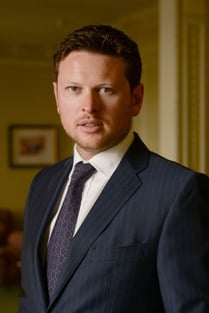In a time when many businesses are putting off making any major changes, several companies are expanding to the region known as Medicon Valley.
Medicon Valley has been recognised for decades as the leading life science cluster in the Nordic region. Yet, a new type of company is being drawn to open offices and launch projects in the area — thanks to a new development in its reputation.
Two of those companies are Viramal, a British pharmaceutical firm based in London but registered its only European subsidiary company at the Medeon Science Park in November 2019; and ENBIOSIS Biotechnology, an enterprise originally from Turkey that established its regional headquarters in Copenhagen in July 2021.
The move made sense for Viramal. The company, which focuses on women’s health and develops solutions for vaginal issues and reproductive endocrinology, already had ties to both countries.

Our co-founders originate from London and Denmark, respectively,” explains Viramal CEO Oliver Bates. “We have previously worked with the Swedish MPA [the Swedish Medical Products Agency], and we have a significant shareholder base in the region. We have also handled our EU patent work from Denmark.”
We had not initially considered greater Copenhagen as a location,” admits Omer Ozkan, ENBIOSIS’s CEO and a co-founder. “But we decided to do so after Copenhagen Capacity [Invest in Skåne’s partner in promoting Medicon Valley] informed us about the fast-growing microbiome cluster and the robust life science ecosystem in the area.”
Emerging hub and field
Both Viramal and ENBIOSIS specialise in dealing with the microbiome — the microorganisms and microbial communities found everywhere, including inside the human body (e.g. the bacteria in the gut). And they were both drawn to the strong and active ecosystem of microbiome research developing within the established biotech and medical research community of Medicon Valley.
![]() Viramal harnesses the new avenues of research and development associated with the study of the human microbiome for a specific purpose: creating new pharmaceuticals for women’s vaginal and reproductive health.
Viramal harnesses the new avenues of research and development associated with the study of the human microbiome for a specific purpose: creating new pharmaceuticals for women’s vaginal and reproductive health.
Bates explains that the company has developed a technology called the “FemMedTech™ Platform” to create healthcare products that are targeted to “treat a range of debilitating and unpleasant conditions commonly experienced by women at various stages of their lives, in particular endometriosis.”
Patent applications have been filed around FemMedTech™ Platform,” Bates says, “a portfolio of transdermal and vaginal delivery technologies, which are intended to maximise efficacy and tolerability whilst avoiding or reducing side effects associated with the current standard of care.”
ENBIOSIS has a more open-ended and data-driven approach to microbiome research.
We search for diagnostic and therapeutic human microbiome biomarkers in vast amounts of metagenomic data,” says Ozkan. He explains that the company then transforms those findings into new products and technologies, like prebiotic/probiotic supplements and biotherapeutics. “[It] requires extensive clinical trials,” he admits, “as well as collaboration with other teams at a multidisciplinary level.”
Yet, despite their different methods and business objectives, both companies feel they have to establish offices in the same region.
“We need to be at the heart of a research medium where clinical research, biotechnology, and pharmaceutics are closely connected,” Ozkan says while talking about his own company, but could also easily include Viramal or any other microbiome company.
Intellectual capital and collaboration
A core reason Medicon Valley is being seen as an emerging global hub for the emerging field of the microbiome is due to the work of investment promotion agencies Invest in Skåne and Copenhagen Capacity. And they not only help raise awareness of the region among microbiome companies but also help those companies move and set up in the area.
Both ENBIOSIS and Viramal received critical information to understand the microbiome landscape, assistance in finding office space, and even support to make important connections for potential partnerships.
And it doesn’t take long for microbiome companies to discover the benefits of expanding into the region.
According to Ozkan, ENBIOSIS already has several possible collaborations on the horizon, including projects involving probiotics and next-generation microbiome medicine, as well as clinical trials.
[Medicon Valley]’s microbiome research environment is just the cluster we have been looking for,” he says. “We believe…the strong companies and highly rated academic institutions in this environment will be a key to our success.”
Meanwhile, Bates says that Viramal already has worked with partners in the region in support of the process of EU registration of its Elegant™ range and the company has begun to receive FDA approval in the United States.
The advantage of being registered in Medicon Valley is that it can provide Viramal with access to intellectual capital and great opportunities for collaboration,” he explains.
Microbiome companies can also gain easy access into the Medicon Valley ecosystem through Medicon Valley Alliance, the life science cluster organisation representing 300+ members across academia, industry and clinical environments in the region, and which works closely with Copenhagen Capacity and Invest in Skåne as one of the partners behind the Microbiome Signature Project.
Find more information on the strengths of the Medicon Valley life science cluster for microbiome companies on the Microbiome Signature Project’s website.
